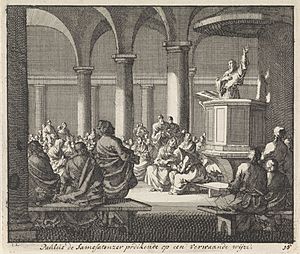Paul of Samosata facts for kids
Paul of Samosata (who lived from about 200 to 275 AD) was an important leader in the early Christian church. He served as the Bishop of Antioch from 260 to 268 AD. He is known for his unique ideas about God and Jesus, which were different from what most Christians believed at the time. His teachings led to a group of followers called Paulianists.
Contents
Paul's Early Life and Role as Bishop
Paul was born in a place called Samosata. He became the bishop of Antioch in 260 AD. He also held a government job, which was unusual for a bishop.
His ideas about God, called Monarchianism, caused a lot of disagreement in the church. People also accused him of using church money for himself. Some historical writings describe him as someone who seemed to care more about wealth and power than being a humble church leader. He was said to have used church funds for his own benefit and lived a very fancy lifestyle. People noticed that his office and public appearances looked more like a government official's than a bishop's. He was also accused of being very strict with those who disagreed with him, but generous with his own staff, who were said to follow his example.
Church Councils and Paul's Removal
In 269 AD, many bishops, priests, and deacons gathered in Antioch for an important meeting called the Synods of Antioch. They discussed Paul's teachings and actions. After much debate, the council decided to remove Paul from his position as bishop. They chose Dominus to take his place. The council also wrote a letter to the bishops of Rome and Alexandria to explain their decision.
However, Paul refused to leave his position. He had friends in high places, including Zenobia, the powerful queen of Palmyra who ruled in Syria. Because of her support, Paul stayed in the bishop's house in Antioch for another four years.
In 272 AD, the Roman emperor Aurelian defeated Queen Zenobia. This meant Paul lost her protection. Emperor Aurelian, who was not a Christian, decided to settle the dispute. He asked the bishops from Italy and Rome for their opinion. They all agreed that Paul should give up his role as bishop. This was one of the first times the Christian Church asked an emperor to help solve an internal problem. This event happened during a time known as the "Little Peace of the Church", when Christianity was growing without much trouble from the government.
Paul's Teachings and Beliefs
Paul's teachings focused on the idea that God is one, a belief called Monarchianism. He taught that Jesus was born as a human being, but that God's divine "Word" or "Logos" came into him. So, Paul believed Jesus was a man who became divine, not God who became man from the very beginning.
In some of his writings, Paul explained his views:
- He believed Jesus became "Christ" (the anointed one) after being filled with the Holy Spirit.
- He thought Jesus became holy and righteous by working hard and overcoming sin.
- Paul taught that Jesus became united with God through his good actions and love. He believed Jesus's will became one with God's will.
- He said that Jesus's love for God made him inseparable from God, always sharing the same will and actions.
Paul's ideas were an early form of Adoptionism, which is the belief that Jesus was adopted as God's son. Some people thought that a later group called the Paulicians were named after him and followed his teachings. However, historical records show that the Paulicians were mostly known for other beliefs, like gnostic and iconoclastic views.
Paul's student, Lucian of Antioch, is thought to have influenced Arius, who later started another important Christian movement called Arianism.
Eusebius's Account of Paul
Another important source of information about Paul of Samosata comes from a historian named Eusebius of Caesarea. Eusebius described some of Paul's actions and beliefs:
- Paul was accused of charging money for his religious services and paying others to spread his ideas.
- He preferred to be called a government official of Queen Zenobia rather than a bishop.
- He stopped the singing of psalms (religious songs) to Christ and instead had women sing psalms praising him as if he were an angel.
- Eusebius also mentioned that Paul was very close with some of his women followers.
What Happened After Paul
The First Council of Nicaea, a very important church meeting in 325 AD, made a rule about Paul's followers, the Paulianists.
If Paulianists join the Catholic Church, they must be rebaptized. If any of their clergy are found to be good people, they can be rebaptized and become clergy in the Catholic Church. But if they are not suitable, they should be removed from their positions. The same rules apply to their deaconesses and other clergy members. Deaconesses are those who wear the special clothing, but since they were not officially ordained, they are considered regular church members.
Athanasius of Alexandria later explained that even though Paul's followers baptized people in the name of the Trinity, their baptism was not considered valid by the main church. The Paulianists seemed to disappear soon after this council.
See also
 In Spanish: Pablo de Samósata para niños
In Spanish: Pablo de Samósata para niños
- Theodotus of Byzantium
- Beryllus of Bostra
- Artemon
- Bogomilism
 | Precious Adams |
 | Lauren Anderson |
 | Janet Collins |


